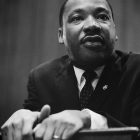
While I appreciate these serious, thoughtful responses to my book by Roger Gottlieb and Kim Chernin, I do not quite see myself reflected in their respective descriptions of the role of spirit (Gottlieb), or the role of hope (Chernin). My claim is that these are not abstract ideas that I attribute to human reality, but that they are concretely revealed by that human reality if we will but embrace “another way of seeing” that makes the presence of both spirit and hope visible in that human reality. The central idea of my book is that human beings are not actually “individuals” in the liberal sense of our existing in separate spheres as disconnected monads, but are rather inherently united by a social bond, a “fraternity” as the present pope calls it, that seeks to make itself manifest in the world through the experience of “mutual recognition.” Because of the legacy of the Fear of the Other that has shaped our cultural conditioning throughout history thus far—a fear reflected in our own individual lives through the social formation of our individual egos—our cultural memory inclines us to see the other as a threat. But coexisting with this fearful impulse in every human interaction and at every moment transcending the fearful impulse, is an unconditioned, wholly original, spontaneous movement toward a new and sudden recognition of one another in which we would become fully present to each other, and in which we would more fully realize ourselves as the source of each other’s completion. {{{subscriber}}} [trackrt]
How to Read the Rest of This Article
The text above was just an excerpt.

